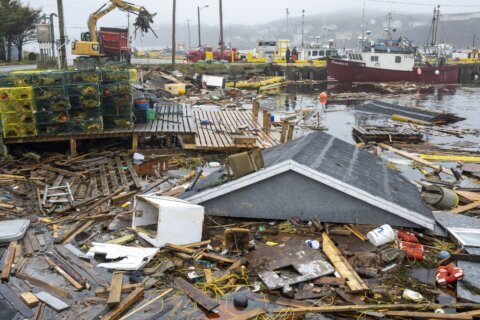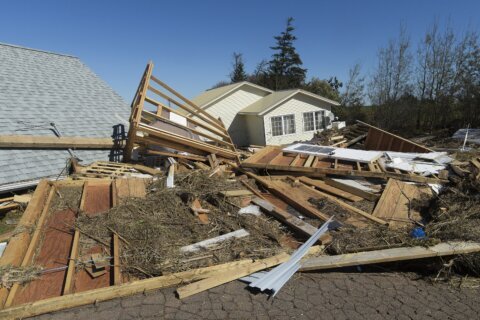VANCOUVER, British Columbia (AP) — An advance team of Canadian soldiers went to work Thursday and more were due as some major highways reopened to limited traffic in British Columbia, but officials said the situation remained critical after floods and mudslides that forced evacuations, blocked transportation routes, caused the death of at least one person and killed thousands of farm animals.
Federal Public Safety Minister Bill Blair said the good news is that the significant rainfall has ended and no further major precipitation is expected for the rest of the week.
“The situation remains critical, but there is an improvement,” he said in Ottawa.
British Columbia’s premier, John Horgan, has declared a state of emergency after record rainfall drenched much of the province’s south for more than 48 hours. One person is confirmed dead in a landslide that swept vehicles off a road near Pemberton, and the Royal Canadian Mounted Police said the number of people believed to be missing at the site had been raised to four.
The province’s public safety minister, Mike Farnworth, said at an afternoon news conference that the cost of repairing damage to roads, bridges and other infrastructure is “going to be substantial.”
“It is far too early at this point to understand what the total damage is going to be,” he said. “The province has the fiscal capacity to be able to rebuild.”
Transportation Minister Rob Fleming said Highway 7, which connects Vancouver to the interior of the province, was reopened to alternating, single-lane traffic. Another major route is expected to be opened by the weekend.
Other highways could take months to repair, Fleming said.
Federal Transport Minister Omar Alghabra said talks were underway with Canadian and U.S. border officials to reach an interim agreement to allow cargo trucks to detour through border crossings to reach their destinations.
Canadian Defense Minister Anita Anand said 120 soldiers would arrive in British Columbia late Thursday to join a nine-member team from the Edmonton-based 3 Canadian Division Immediate Response Unit that arrived a day earlier to assess the situation for planning and coordinating relief efforts.
An additional 160 military personnel were preparing to leave Edmonton with a convoy of military vehicles and equipment, she said.
Farnworth said the soldiers will assist with evacuation efforts, help with logistics and operate equipment.
About 17,000 people remain out of their homes, with 6,900 properties under evacuation order, he said. An additional 2,700 properties are on alert for possible evacuation.
The weekend storm left all major routes between the Lower Mainland of British Columbia, where Canada’s third largest city of Vancouver is, and the interior of the province cut by washouts, flooding or landslides.
With dairy farms underwater around the city of Abbotsford and transportation routes closed, the province could face a shortage of milk products.
“There will be a short-term interruption, but everybody that’s involved in the industry is trying to get everything back to normal as quickly as possible to get this whole supply chain thing back to some semblance of normality,” Holger Schwichtenberg, chair of the British Colombia Dairy Association.
On his farm near Agassiz, Schwichtenberg is tending to 50 head of cattle brought from flooded areas around Abbotsford.
Schwichtenberg said 59 dairy farms scrambled to save their cows. Some were able to load their animals on trucks. A YouTube video shows one person on a jet ski leading a cow through water up to the animal’s back.
Abbotsford Mayor Henry Braun said he had heard that about 2,000 cows had died in the flooded area.
Schwichtenberg said closed roads are preventing trucks from collecting milk from farms.
“If you’re milking but the tracks can’t get to your farm, then you have to dispose of the milk because it’s a perishable product,” he said.
Lana Popham, the province’s agriculture minister, said residents shouldn’t worry about food shortages.
“Our food is secure. We’re just re-gigging routes to get it to folks,” she said. “We’re definitely not going to run out of food.”
Flooding is also delaying deliveries of Pfizer Canada products, including the company’s coronavirus vaccine.
“Weather conditions have resulted in an unfortunate delivery delay of our medicines to BC,” Pfizer said on Twitter. “We are working to ensure the supply chain has sufficient inventory of critical products for patients.”
Copyright © 2024 The Associated Press. All rights reserved. This material may not be published, broadcast, written or redistributed.







